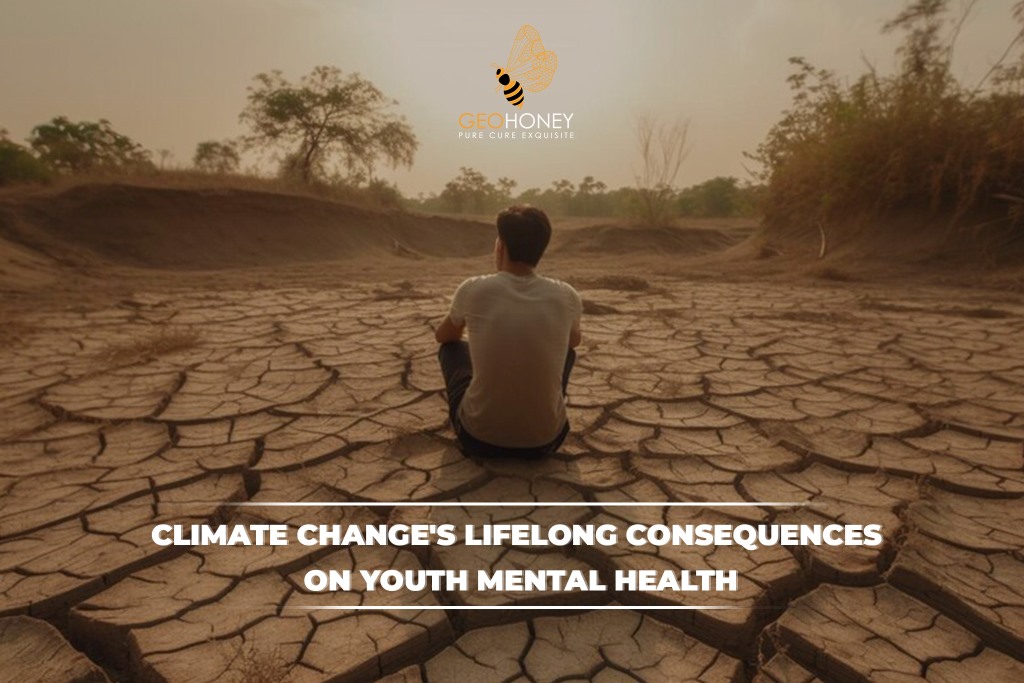- Tokyo: 10:59
- Singapore: 09:59
- Dubai: 05:59
- London: 01:59
- New York: 20:59
Climate Change May Have "Lifelong Consequences" for Young People's Mental Health

According to a new report from the American Psychiatric Association, climate change can have a significant impact on young people's mental health.
The paper, written in partnership with the climate advocacy organisation ecoAmerica, examines how environmental events associated with climate change, such as weather disasters, high heat, and poor air quality, can trigger or exacerbate mental health concerns in children and adolescents.
According to the findings, natural disasters can cause post-traumatic stress disorder in certain groups. Long-term issues such as heat, drought, and poor air quality can raise the risk of anxiety, depression, bipolar disorder, aggressiveness, cognitive impairment, and other mental illnesses.
"The report documents psychological harms that are happening right now to children and youth in our country," Dr. Dennis P. Stolle, the association's senior director of applied psychology who reviewed the paper, wrote in an email to CNN. "These are not issues that can be put off until later." As a society, we must act immediately."
The research, which was issued on Wednesday, is a follow-up to a study done by the American Psychiatric Association and ecoAmerica in 2021. It is the most recent in a series of studies conducted by the two organisations dating back to 2014. The research does not entail novel experiments; rather, it summarises existing research on climate change, mental health, and youth development.
Problems Start Before Birth
Climate change-related weather events, according to Dr. Sue Clayton, a professor of psychology at the College of Wooster and the report's lead author, makes children more exposed to mental health implications since children may lack the coping tools that adults do. If a parent is anxious as a result of an environmental disaster, such as high heat or wildfires, it may have an impact on their children's mental health as well.
"If your parent is under stress because of worries or these fears, that can affect a child and their mental health," Clayton went on to say. "Experiencing trauma at an early age can have lifelong impacts on emotional health and well-being."
According to the findings, these mental health implications begin even before a child is born. Weather disasters, high temperatures, air pollution, and maternal anxiety during pregnancy might increase a child's chance of a variety of behavioural and developmental difficulties, including anxiety, depression, ADHD, developmental delays, low self-control, and psychiatric disorders.
According to Clayton, the implications might influence the development of the neurological system and are often irreversible. Weather events associated with climate change, as well as exposure to news coverage about them, may cause anxiety, sleep problems, PTSD, impaired cognitive development, and major depressive disorder in newborns and young children.
Adolescents are vulnerable to the mental health effects of climate change-related natural catastrophes, such as trauma and anxiety, but they can also be indirectly affected, according to the paper. Weather, heat, and pollution can all interrupt a child's life, causing courses to be cancelled, damage to their home, or food shortages.
How do you Envision the Future?
According to the report, adolescents and young people are particularly concerned about climate change. Young people are more inclined than their elders to be disturbed or concerned about governments' or authority figures' perceived failure to act on climate change. Climate change-related events and worry about the topic, according to the paper, are connected to increased risks of anxiety, despair, strained social connections, and suicide.
"They're worried about it because they know it's going to affect their future," added Clayton. "How do you plan for the future when you don't know what the future will look like?"
She is especially concerned about how climate change will affect young adults as they make career and relationship decisions. According to the report, the effects of extreme weather and climate anxiety on decision-making, poor cognition, and lower levels of self-control.
"They're making the decisions that will affect the rest of their lives, in terms of their career goals and plans," he said. "Do they intend to save money?" What about their child-bearing decisions?"
The researchers point out that not all young people are affected by climate change in the same manner. persons from marginalised or low-income backgrounds are more likely to be exposed to extreme weather, particularly indigenous groups, communities of colour, women, and persons with disabilities.
They may also have less options for dealing with extreme weather as compared to residents in affluent communities. Higher-income communities, for example, have more tree protection from heat, according to Clayton.
The paper, however, emphasised measures to mitigate the impact of climate change on teenage mental health. Among its proposals are that educational systems play a larger role, such as developing more protective facilities and teaching climate change curricula.
Health care providers should also test youth for climate-related distress early and on a frequent basis. According to Stolle, an increasing number of clinical psychologists are treating people who are concerned about climate change.
"Clinical psychologists are finding themselves on the frontlines of treating the patients who are suffering from these concerns," he said in the letter. But, according to Clayton, it's not simply a problem for doctors and nurses.
"This affects all of us," she went on to say. "Children are effectively society's future." We sought to make information about the problem and its solutions available to groups that wished to access it."
Source: wvtm13.com




Climate change has been a threat to us no excuse, for thinking about how to resolve this? How can we get over this dire situation we are facing now?